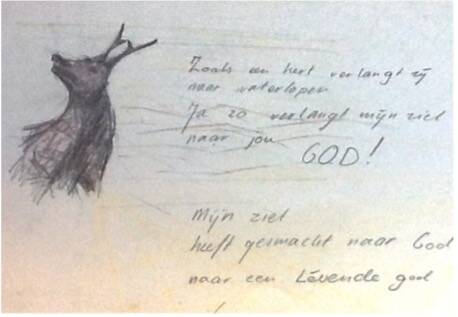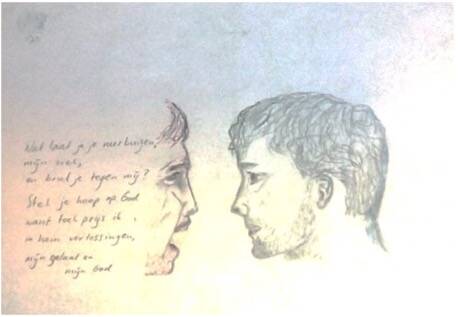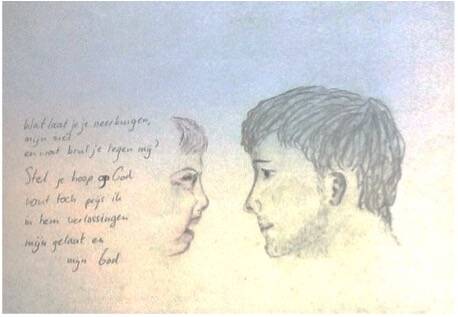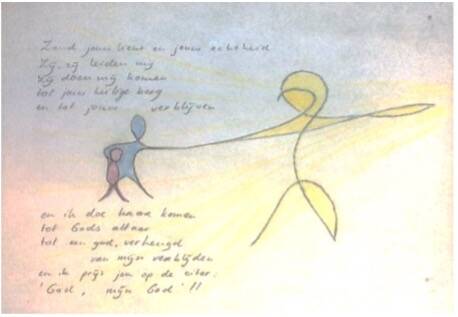Dialogue with my soul
Reading from Psalm 42/43
For the director of music. A maskil of the Sons of Korah.
As the deer pants for streams of water,
so my soul pants for you, my God.
My soul thirsts for God, for the living God.
When can I go and meet with God?
(...)

Why, my soul, are you downcast?
Why so disturbed within me?
Put your hope in God,
for I will yet praise him,
my Saviour and my God.
(…)

By day the Lord directs his love,
at night his song is with me—
a prayer to the God of my life.
(…)

Why, my soul, are you downcast?
Why so disturbed within me?
Put your hope in God,
for I will yet praise him,
my Saviour and my God.
(…)

Send me your light and your love,
let them lead me;
let them bring me to your holy mountain,
to the place where you dwell.
Then I will bring her to the altar of God,
to God, my joy and my delight.
I will praise you with the lyre,
O God, my God.

Why, my soul, are you downcast?
Why so disturbed within me?
Put your hope in God,
for I will yet praise him,
my Saviour and my God.

Why "I"?
It may seem a bit individualistic, but the Apostles’ Creed starts in the first person: ‘I believe’ (‘Credo’). Some later creeds change that: “We believe in God the Father,” they sing. That is nice, for religion is something that binds us together with others. Saying “we” can make us feel part of a larger whole. It also allows us to silence our doubts in the assumed faith of the community. Using “I” makes it very different, it forces me to tell you were I stand. I have to take responsibility for my own thoughts and words, for the way I interact with the world around me.
Therefore, “I” is not a bad word to start a meditation. When my nephew was born, I wrote a small poem: “With you, a world is born.” You could argue that every “I” constitutes a unique perception of reality. In fact, we only perceive the universe within ourselves, mediated by our senses and constructed through our own interpretations. Some ancient readers of Genesis read the story of Adam and Eve not as the story of the creation of the world, but as the story of the creation of the soul, its separation between male and female and its loss of innocence. Paradise lost, to them, meant that the soul had lost her connection to her inner being.
“I” is an entire universe. “I” is a realm where my sensations, feelings and perceptions come together, where my thoughts are formed and my actions originate. Meditation is different from analysing a text with my mind alone. It is bringing that text into my universe, letting it interact with my sensations, feelings and thoughts.
So perhaps this is a good time to ask you to do the same. Find a place and a time where you can concentrate on yourself. Where you do not have to be concerned with your name or status with respect to others, a place where you can be “I.” If you pray, I think it would be best to keep it simple: “Here I am, Lord, help me to see myself in your light and love.”
I AM
In the book of Genesis, the fugitive Moses has an experience of God. “Who are you?” Moses asks. “I AM,” is the answer. The God of Moses has no name or form. Likewise, if you want to know who you are, then strip away everything that is on the outside. Take your time to turn inward and go beyond the simple "I" that is speaking in your mind.
Now that you do, you immediately find that you are not alone, not even within you. Paul could speak about us as body, soul and spirit. Let’s try that for a bit. Try to be aware of your body, whether it is comfortable, whether you feel fit of hungry, weak or tired. Sometimes I just lie down on the floor and try to feel each part of me. Then try to become aware of your feelings and to allow yourself to feel joy or sadness when your meditation brings you to a memory or association. Don't label or explain the feeling, but just observe. Let your mind become aware of your body and soul.
Psalm 42/43
If you think this is all very modern or some form of eastern meditation that has nothing to do with the Bible, then read the psalm 42 and 43. This was written some three thousand years ago by musicians in the temple of Jerusalem. They wrote for people who somehow had lost touch with themselves and their earlier faith community. People who feel like God does not answer their prayers, does not really help them. Yet they remember the good things of worshipping as a group, and long to feel secure again in God’s presence.
This psalm is very dear to me. It is brutally honest and does not have a cheap happy ending. Yet it captures my psychology and spirituality like nothing else has done in my life. When I was in university to study industrial engineering, I took Hebrew classes to be able to read and hear this Psalm in its original language. I made drawings of its scenes and put its verses to music. For the first time, I understood what was meant with ‘soul’ in the Bible. It has nothing to do with futile academic or theological debates about the existence of an eternal soul, but everything with the real life experience of every human being today. It is that part of me that does not communicate through words, but drives me through feelings of joy and sadness, disgust and desire. I can address it with my mind, but it does not really communicate with me in words and sentences. Yet I can comfort it when it is crying, until it is like a little child in my arms. In the psalm, the mind turns to God as the source of light and love. Our mind needs to be filled with light and love if it is to take good care of our body and soul.
All of Me: Mind, Soul and Body - and the Heart
Some Greco-Roman philosophers believed that only the soul (psyche) or the intellect was capable of experiencing God. In a beautiful Greek allegory, Psyche is a girl that has to be kissed to life by the divine, symbolized by the god Amor who will carry her out of the body and this earthly existence. And it is absolutely true that divine love can lead our soul upward to God. Unfortunately, it has also led some, Christians and others, to believe that the soul needs to detach itself from the body in order to be one with God. Some have denied the value of the body. That was not how Jesus saw it. When one of the Jewish leaders asked Jesus which religious command was the most important, Jesus stringed together two passages from the Thora:
“The most important one,” answered Jesus, “is this: ‘Hear, O Israel:
The Lord our God, the Lord is one. Love the Lord your God with all your heart and with all your soul and with all your mind and with all your strength.’
The second is this: ‘Love your neighbour as yourself.’
There is no commandment greater than these.” (Mark 12:29-31)
For Jesus, love trumps all religious and moral commandments. Love unites God, me and the other. And true love involves all of me: my bodily strength, my soul and my mind. Today, we often equate love with the heart, but that was not the meaning of the word ‘heart’ in Jesus’ days. The flesh (the body), blood (associated with the soul) and the breath (associated with spirit) together form the heart, which is after all a muscle that pumps blood filled with oxygen from the longs throughout the body. In the Jewish thinking that Jesus grew up with, all of our being comes together in the heart. That is why they referred to the heart as the source of our choices. For our actions are not just the result of conscious decision-making in our mind, they result from the interaction between body, soul and spirit.
Scientists have demonstrated just how relative free will is. A lot of the decisions that we think we take consciously are already visible on a neurological level about half a second earlier. Our genome and history have programmed us for these decisions. But that does not mean we can’t change: these ‘decisions’ and our subsequent experiences continue to rewrite our programming. And we can stand back and consciously try other decisions that will help us develop in positive ways.
In his letters to the Corinthians, Paul speaks about people who are led by their flesh (we would say their hormones or instincts), by their soul (as in their feelings or ambitions), or by their spirit (both in good and bad ways). In Jewish thinking, the mind can be filled with different ‘spirits,’ divine or demonic (we could think of thoughts and ideologies). Paul believed that you can choose to be led by ‘holy spirit.’ It will transform how you feel and act.
So if the Apostles’ Creed starts with “I,” it does not simply start with my mouth or my consciousness forming words, it starts with all of me. If my heart's decision to have faith in God's love is to be stable, then I have to go all in: body, soul and spirit.
* *

Psyché ranimée par le baiser de l'Amour (The soul revived by the kiss of love). Marble, 1793. Antonio Canova (1757–1822). Louvre, Paris.
Suggestions for dialogue
A moderator can explain the dialogue steps and invite people to contribute:
- Check in with yourself. Share with each other how you are in this moment. Then take a moment again to seek stillness, humility and openness.
- First round: Share something from the text or image(s) that stood out to you and that you would like to explore with the group, briefly indicating the thoughts and feelings that it evoked within you. Listen to the others do the same: what resonates with you? Responses in this round should be limited to questions for clarification.
- Second round: Name one or two things that resonated with you from the things that others just shared.
- Third round: Having heard the group, the moderator names the main topics for exploration. The moderator may also propose a common thread that emerged in several topics. The exploration normally starts with asking the person(s) who brought up the topic to expand on it.
- Leave room for silence and contemplation.
- Check out by sharing what you take home from this dialogue.
These suggestions are an adaptation of the Estuary protocol. Look for more at https://www.estuaryhub.com
Add comment
Comments